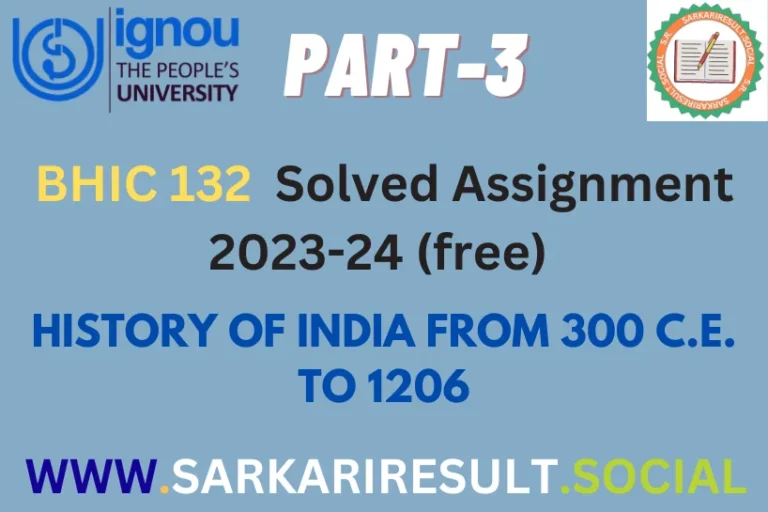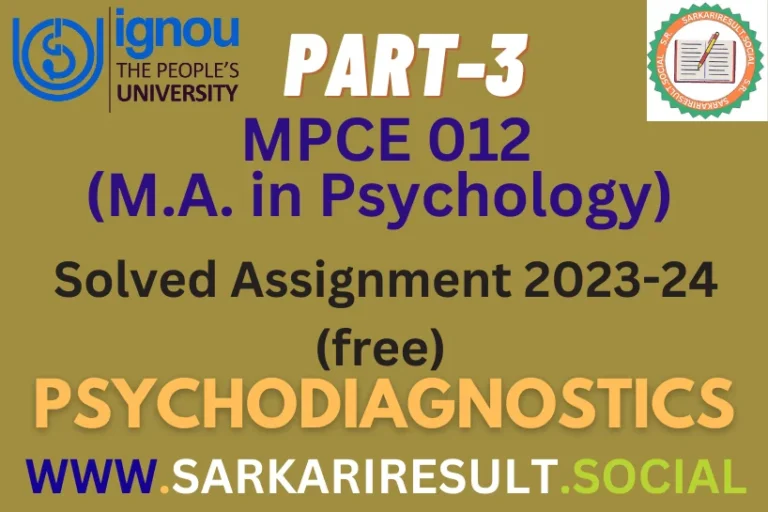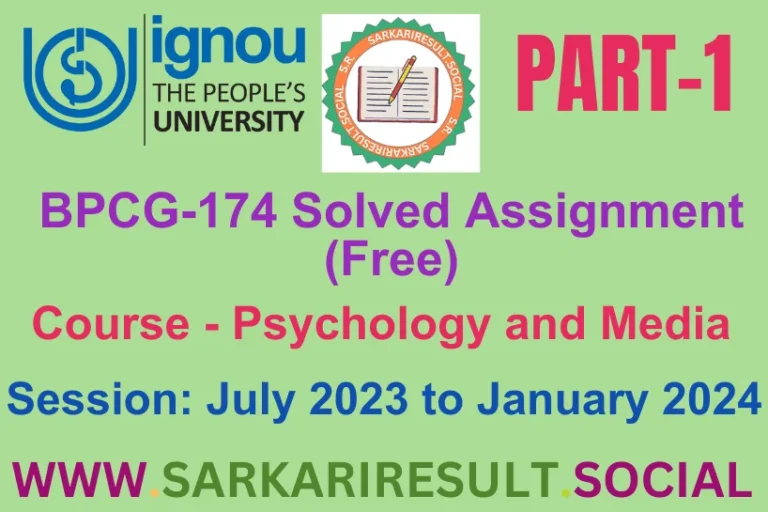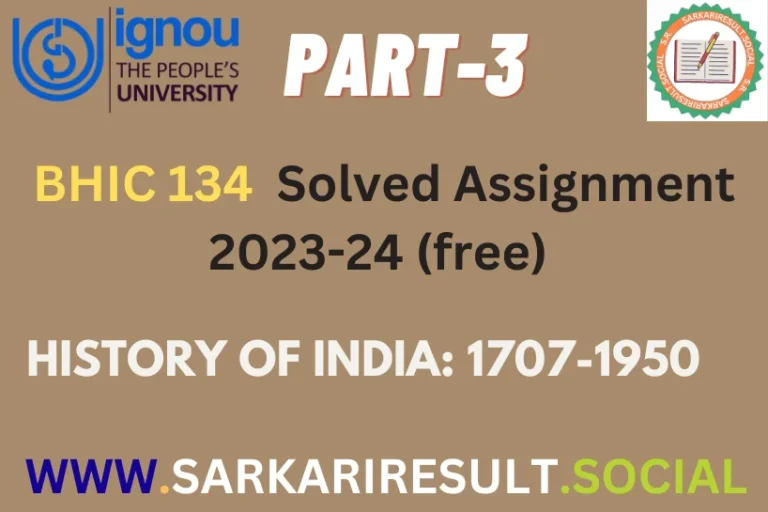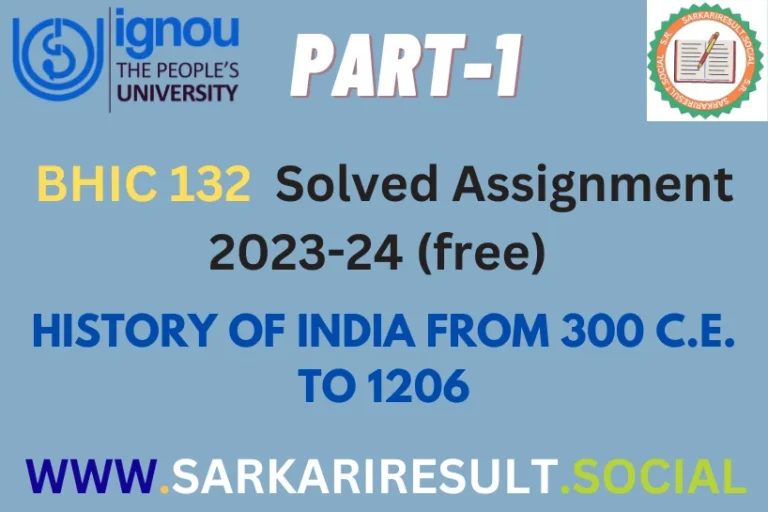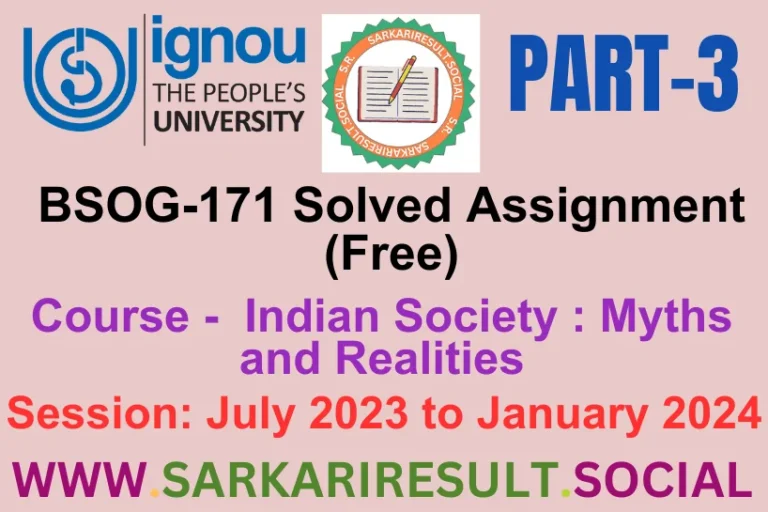Check BPSC-132 IGNOU Solved Assignment 2023 (free) in best quality
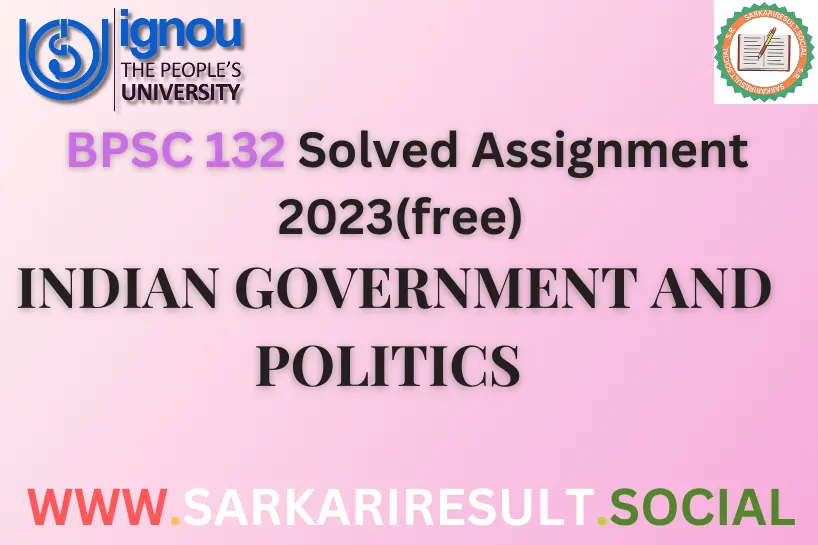
BPSC-132 IGNOU Solved Assignment 2023 (free)
Get ready for an exciting exploration into Indian Government and Politics (BPSC 132) as part of IGNOU’s Bachelor of Arts program. Discover how our country’s democracy works, learn about the decisions that shape our nation, and understand how power influences our lives. From studying how our government is structured to examining the role of important institutions, this course will give you a deeper understanding of Indian politics. Get ready to dive in and have an amazing adventure with BPSC 132!
To support students in their learning journey, we provides IGNOU solved assignments that serve as valuable resources for IGNOU assignment. These assignments not only reinforce the concepts learned but also encourage students to think critically and develop their own perspectives on political theories.
Assignment – I of BPSC-132 IGNOU Solved Assignment 2023 (free)
Q.1 Discuss Marxist perspective to study Indian politics.
Ans. Marxism is a social and political theory developed by Karl Marx, which provides a unique perspective to study Indian politics. It focuses on understanding society in terms of the economic relationships between different classes. Let’s explore the Marxist perspective on Indian politics.
According to Marxism, Indian politics can be analyzed by looking at the social classes and their struggles for power and resources. In India, like in many other countries, there are different classes such as the capitalists (or bourgeoisie) who own and control the means of production, and the workers (or proletariat) who sell their labor to earn a living.
Marxists argue that the Indian political system, like any other capitalist system, is primarily driven by the interests of the ruling class, which in India is the bourgeoisie. They believe that political decisions are often made to benefit the capitalist class, who seek to maximize their profits and maintain their control over society.
Marxists also highlight the existence of social inequality in Indian politics. They argue that the capitalist system in India creates a wide gap between the rich and the poor. This inequality is reflected in political power as well, with the wealthy and influential individuals having more influence over political decisions compared to the working class.
Marxism emphasizes the role of the state in protecting the interests of the ruling class. It suggests that the Indian government, which is controlled by the bourgeoisie, enacts policies and laws that serve their economic interests. For example, policies favoring big businesses or the rich are often prioritized over those that benefit the working class.
Another important aspect of the Marxist perspective is the idea of class struggle. Marxists believe that the working class, which comprises the majority of the population, should unite and fight against the capitalist class to achieve social justice and equality. They argue that the working class should challenge the existing political system and strive for a society where wealth and power are shared more equitably.
In conclusion, the Marxist perspective provides a unique lens to study Indian politics. It focuses on the economic relationships between different classes and emphasizes the role of the ruling class in shaping political decisions. It highlights social inequality and the need for the working class to unite and fight for a more equitable society.
By considering the Marxist perspective, we can gain a deeper understanding of power dynamics and social issues in Indian politics.
Also see : BGDG 172 IGNOU solved assignment 2023

Also see : BPSC-131 IGNOU Solved Assignment 2023 (free)
Q.2 Explain the essential features of the Indian Constitution.
Ans. The Indian Constitution, adopted on 26th January 1950, is a crucial document that sets out the framework for governance in India. It provides the principles and rules that guide the functioning of the government and protects the rights and freedoms of its citizens. Let’s explore the essential features of the Indian Constitution.
1. Preamble: The Constitution begins with a Preamble that outlines the objectives and aspirations of the Indian people. It highlights the principles of justice, equality, and liberty, and sets the goals of securing social, economic, and political justice for all citizens.
2. Democratic Republic: The Indian Constitution establishes India as a democratic republic, where the power of the government is derived from the people. It ensures that the people have the right to elect their representatives and participate in the decision-making process through regular elections.
3. Fundamental Rights: The Constitution guarantees fundamental rights to all citizens, including the right to equality, freedom of speech and expression, right to education, and protection from discrimination. These rights ensure that individuals are protected and have the freedom to live with dignity and equality.
4. Directive Principles of State Policy: The Constitution includes Directive Principles of State Policy, which are guidelines for the government to promote social and economic justice. These principles aim to secure the welfare of the people by providing provisions for public health, education, and the protection of the environment.
5. Federal Structure: The Indian Constitution establishes a federal structure with a division of powers between the central government and the state governments. It outlines the responsibilities and jurisdictions of both levels of government, ensuring a balance of power and decentralization of governance.
6. Fundamental Duties: The Constitution also includes Fundamental Duties, which are the responsibilities of every citizen towards the nation. These duties include respecting the national symbols, promoting harmony, and safeguarding public property.
7. Independent Judiciary: The Constitution ensures the independence of the judiciary as a separate branch of government. It establishes the Supreme Court and the High Courts, which have the power of judicial review to protect the rights and liberties of citizens.
8. Secularism: The Indian Constitution embraces the principle of secularism, which means that the state does not promote any specific religion and treats all religions equally. It guarantees freedom of religion to individuals and prohibits discrimination based on religious beliefs.
9. Social Justice: The Constitution aims to achieve social justice by providing reservations and affirmative action for disadvantaged and marginalized groups. It seeks to uplift historically oppressed sections of society through measures such as reservations in education and employment.
10. Amendment Procedure: The Constitution provides a procedure for amending its provisions to adapt to changing times and needs. Amendments require the support of the Parliament or state legislatures, ensuring a democratic process for modifying the Constitution.
These are the essential features of the Indian Constitution that establish the principles of democracy, fundamental rights, federalism, and social justice. The Constitution acts as a guiding document for the governance of India, protecting the rights and freedoms of its citizens and ensuring a just and inclusive society.
Assignment – II of BPSC-132 IGNOU Solved Assignment 2023 (free)
Q.1 Critically examine the Basic Structure doctrine.
Ans. The Basic Structure doctrine is a legal principle established by the Supreme Court of India. It holds that certain fundamental features of the Indian Constitution cannot be altered or amended by the Parliament, even with a constitutional amendment. This doctrine is crucial in safeguarding the core principles and values of the Constitution. However, it can also be seen as limiting the power of the elected representatives.
The Basic Structure doctrine serves as a guardian of democracy and prevents any arbitrary changes to the Constitution. It ensures that the fundamental rights of citizens, the principle of separation of powers, and the federal structure of the country remain intact. By establishing these inviolable principles, the Basic Structure doctrine protects the citizens’ interests and prevents the concentration of power.
However, some argue that the Basic Structure doctrine can be seen as undemocratic since it places significant constraints on the elected representatives. It limits their ability to make changes that they believe are necessary for the country’s progress. Critics argue that elected representatives, being accountable to the people, should have the authority to make amendments to the Constitution in line with changing times and circumstances.
Moreover, there is ongoing debate regarding the exact components of the Basic Structure. The judiciary plays a significant role in determining what constitutes the Basic Structure, which can lead to differing interpretations. This can create ambiguity and open the possibility of judicial overreach, where the judiciary assumes excessive power in deciding what can or cannot be amended.
In conclusion, the Basic Structure doctrine is an essential legal principle that protects the core principles of the Indian Constitution from arbitrary amendments. It ensures the preservation of fundamental rights, separation of powers, and the federal structure of the country.
While it serves as a guardian of democracy, critics argue that it can limit the power of elected representatives and potentially lead to judicial overreach. The ongoing debate and evolving interpretations of the Basic Structure doctrine reflect the complex nature of balancing democratic principles and constitutional stability.
Also see : BPAG-171 Study Material Pdf free in English

Q.2 Explain the powers and functions of the Speaker of Lok Sabha.
Ans. The Speaker of Lok Sabha, the lower house of the Indian Parliament, holds a significant position in the functioning of the legislative body. The Speaker is responsible for ensuring the smooth conduct of parliamentary proceedings and upholding the principles of democracy. Let’s explore the powers and functions of the Speaker:
1. Presiding Officer: The Speaker presides over the sessions of the Lok Sabha. They maintain order, decide on points of order, and have the authority to discipline members who violate parliamentary rules.
2. Decision-making: The Speaker has the power to make final decisions on matters of procedure and interpretation of parliamentary rules. Their rulings are binding and are meant to maintain decorum and fairness during debates and discussions.
3. Casting Vote: In case of a tie during voting on any issue, the Speaker has a casting vote. This means that the Speaker can vote to break the tie and decide the outcome.
4. Committee Appointments: The Speaker appoints members to various parliamentary committees. These committees play a crucial role in examining and scrutinizing bills, conducting inquiries, and overseeing the functioning of government departments.
5. Maintaining Order: The Speaker ensures that parliamentary debates are conducted in an orderly manner. They have the power to reprimand or suspend members who disrupt proceedings or engage in unruly behavior.
6. Representing the House: The Speaker represents the Lok Sabha in its relations with the President, the Rajya Sabha (the upper house), and other authorities. They also represent the Lok Sabha in interactions with foreign dignitaries.
7. Speaker’s Vote: The Speaker does not cast their vote on any matter being discussed in the Lok Sabha unless there is a tie. Their role is to remain impartial and act as a neutral arbiter.
Overall, the Speaker of Lok Sabha plays a crucial role in upholding parliamentary democracy. They ensure the smooth functioning of the house, maintain order, and uphold the principles of fairness and justice. Their powers and functions are aimed at facilitating effective and constructive debates while preserving the dignity and integrity of the parliamentary process.
Also see : Check out IGNOU Assignment submission status 2023
Q.3 Discuss the parliamentary devices to control the executive.
Ans. Parliamentary devices are mechanisms used by the legislature to control and oversee the actions of the executive branch of government. These devices ensure that the government remains accountable to the people and that its policies and actions align with the interests of the citizens. Here are some parliamentary devices to control the executive:
1. Question Hour: Members of Parliament (MPs) have the opportunity to ask questions to ministers during the Question Hour. This device allows MPs to seek information, clarify government policies, and hold the executive accountable for its actions.
2. Motion of No Confidence: MPs can bring forward a motion of no confidence to express their lack of confidence in the government. If the motion is passed, it indicates that the majority of MPs believe that the government is not capable of effectively governing the country, which can lead to the government’s resignation or the calling of fresh elections.
3. Debates and Discussions: Parliament provides a platform for MPs to debate and discuss government policies and actions. Through these debates, MPs can express their views, offer criticism, and propose alternative solutions. This helps in scrutinizing the executive’s decisions and holding them accountable.
4. Parliamentary Committees: Committees are formed to examine specific issues in detail. These committees consist of MPs who review government policies, monitor the implementation of laws, and conduct inquiries. Parliamentary committees have the power to summon ministers, officials, and experts to gather information and ensure transparency and accountability.
5. Budget Scrutiny: Parliament has the authority to scrutinize the budget presented by the government. MPs can analyze the allocation of funds, question the government’s financial decisions, and propose amendments to ensure that public money is being spent wisely and in the best interests of the country.
6. Judicial Review: While not strictly a parliamentary device, the judiciary plays a crucial role in holding the executive accountable. The courts can review the constitutionality of government actions, policies, and laws, ensuring that they are in line with the principles and provisions of the constitution.
These parliamentary devices act as checks and balances, allowing the legislative branch to monitor and control the executive’s actions. They provide avenues for transparency, accountability, and democratic decision-making, ensuring that the government remains answerable to the people it serves.
Assignment – III of BPSC-132 IGNOU Solved Assignment 2023 (free)
Q.1 Write a brief note on Parliamentary Privileges.
Ans. Parliamentary privileges are special rights and immunities granted to members of Parliament to ensure their independence and freedom of speech while performing their legislative duties. These privileges include freedom of speech, immunity from legal action for their speeches and votes, and the right to control their own internal affairs.
Parliamentary privileges are essential for MPs to express their views without fear of reprisal and to function effectively as representatives of the people. However, these privileges are not absolute and must be exercised responsibly and in line with the principles of democracy and public interest.
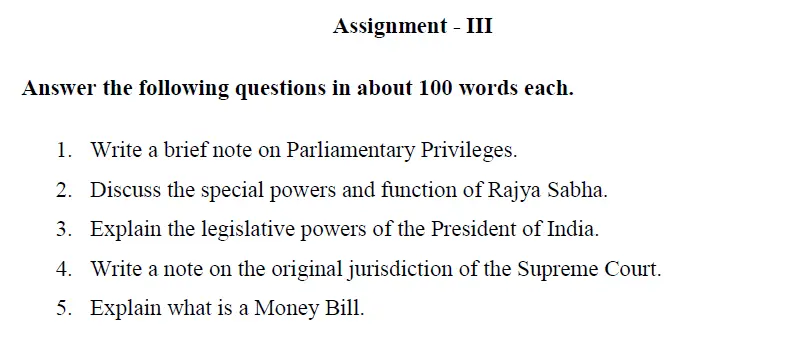
Q.2 Discuss the special powers and function of Rajya Sabha.
Ans. The Rajya Sabha, or the Council of States, is the upper house of the Indian Parliament. It has special powers and functions:
1. Representing states: Rajya Sabha represents the interests of the states and union territories. It ensures that the federal structure of India is maintained and that states have a platform to voice their concerns and interests.
2. Legislative role: Rajya Sabha plays a crucial role in the legislative process. It reviews and suggests amendments to bills passed by the Lok Sabha, the lower house, and ensures thorough scrutiny of legislation.
3. Special powers: Rajya Sabha has the power to initiate and pass certain types of bills, such as those related to the creation of All India Services, the amendment of the Constitution, and the implementation of international treaties.
4. Expertise and experience: Rajya Sabha members are often experienced and knowledgeable individuals in various fields. Their expertise contributes to informed debates and discussions on important issues.
5. Protecting minority interests: The Rajya Sabha acts as a check on the majority-driven Lok Sabha. It provides a platform for discussing and safeguarding the interests of minority communities and regions.
Overall, the Rajya Sabha plays a critical role in shaping legislation, representing state interests, and ensuring a balanced and inclusive decision-making process in the Indian Parliament.
Also See : BPCC-131 IGNOU Solved Assignment 2023 (free)
Q.3 Explain the legislative powers of the President of India.
Ans. The President of India has legislative powers, which include the ability to sign bills into law, withhold assent, or return bills for reconsideration. The President can summon, prorogue, or dissolve the Parliament’s two houses (Lok Sabha and Rajya Sabha) and can also address the Parliament.
The President can also issue ordinances during the recess of Parliament if an urgent law is required. However, these powers are exercised on the advice of the Council of Ministers. The President’s legislative powers help ensure a balanced and effective functioning of the Indian government and its legislative processes.
Q.4 Write a note on the original jurisdiction of the Supreme Court.
Ans. The Supreme Court of India has original jurisdiction, which means it has the authority to hear certain types of cases directly without going through lower courts. The Supreme Court can hear disputes between the central government and state governments, or between different state governments.
It also has original jurisdiction in cases involving violations of fundamental rights. This means that individuals can directly approach the Supreme Court if they believe their fundamental rights guaranteed by the Constitution have been violated. The original jurisdiction of the Supreme Court allows it to directly address important constitutional and intergovernmental disputes, ensuring the protection of rights and the maintenance of federal harmony.
Q.5 Explain what is a Money Bill.
Ans. A Money Bill is a type of legislation that deals with financial matters, such as taxation, government expenditure, or borrowing. It is introduced in the Lok Sabha, the lower house of the Indian Parliament, and is subject to a specific procedure.
A Money Bill can only be introduced with the recommendation of the President and must be passed by the Lok Sabha. The Rajya Sabha, the upper house, can discuss and suggest amendments, but it cannot reject or delay a Money Bill. This distinction ensures that matters of financial importance can be expedited, allowing the government to effectively manage the country’s finances.

